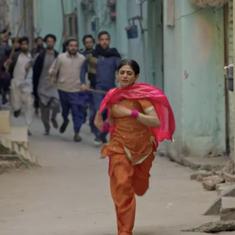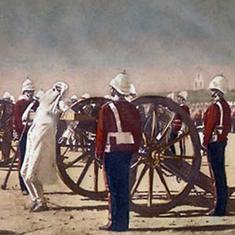The Big Story: Transaction analysis
Allegations of corruption weighed heavy on the fortunes of the Manmohan Singh-led United Progressive Alliance government towards the end of its second term. By 2014, the Bharatiya Janata Party and its prime ministerial candidate, Narendra Modi, had converted this odour of impropriety into a lethal campaign weapon. Four years down the line, though, Modi is finding it difficult to live up to his promises, as bit by bit, allegations of corruption are also stacking up against the BJP-led government as well as state governments led by the saffron party.
On Saturday, for instance, an article in the Wire alleged that Union minister of railways, Piyush Goyal, carried out a transaction that raises questions of conflict of interest. Goyal and his wife allegedly sold shares of a privately owned company to a businessman without disclosing this in the mandatory statement of assets and liabilities to the Prime Minister’s Office in 2014 and 2015. The businessman had investments in power and renewables energy at a time when Goyal was minister of state with independent charge of power, coal and new and renewable energy, raising questions of impropriety.
The principal Opposition party, the Congress, has latched into this allegation, hoping to replicate Narendra Modi’s success in positioning himself as an anti-corruption crusader in 2014. On Saturday, the Congress demanded that Prime Minister Modi remove Goyal from his cabinet. If that step was not taken, claimed the Congress, it would have been “proved that the prime minister was in full knowledge of and had given consent to the gross impropriety and conflict of interest of his favourite minister”.
Allegations of corruption have arisen against the Modi-led BJP before as well. In Karnataka, the BJP’s chief ministerial candidate in the upcoming Assembly elections BS Yeddyurappa saw wide-ranging allegations of corruption against him during his last term as chief minister (which ended in 2011). Last week, the BJP bought back mining operator Ballari Gali Janardhan Reddy into the party to help with the elections. Reddy had spent more than three years in prison after he was convicted for illegal mining.
In the Vyapam scam relating to the sale of government jobs and seats in educational institutions in BJP-ruled Madhya Pradesh, more than 25 witnesses and whistleblowers have died – often as a result of accidents. Others involved in the case claim that they have received death threats. In Chhattisgarh, another BJP-ruled state, Chief Minister Raman Singh’s son has been accused of owning offshore assets on the British Virgin Islands.
There is also the defence sector: the Congress has accused the Modi government of failing to be transparent in the deal to buy 36 Rafale fighter jets from the French aircraft manufacturer Dassault in 2016. The Congress claimed that the deal it had negotiated when it was in power came at a third of the final price agreed to by the BJP government.
Perhaps nothing captures the slippery slope of corruption allegations as the Nirav Modi affair. As news of the Rs 11,360-crore bank scam by jeweller Nirav Modi broke in February, the Congress blamed the Modi government for allowing him flee India. The Opposition party noted that Nirav Modi had been present at a World Economic Forum meeting along with Prime Minister Modi. The party used the epithet “Chhota Modi”, Little Modi, in an attempt to link Nirav with Narendra in the public imagination.
Even though there was little to directly link the Modi government and Nirav Modi, the Congress’s attempt was at least partially successful as the Union government scrambled to pass a Fugitive Economic Offenders bill targeted at people such Nirav Modi.
If Modi is not careful, corruption could end up becoming a major campaign issue in the 2019 Lok Sabha elections.

Punditry
- There is no proof that death penalty will deter sexual violence against children. It could further harm victims, explains Flavia Agnes in the Indian Express.
- Prime Minister Narendra Modi has a short window to build on the positive outcomes of the Wuhan meeting, writes Happymon Jacob in the Hindu.
- Each of the Centre’s objections to Justice Joseph fails to persuade, argues Rishad A Chowdhury in the Hindustan Times.
- Federal quarrels are snowballing in India. To manage this, this Mint edit proposes a revival of the inter-state council, a constitutional body that has representatives of the Union government as well as chief ministers of states.
Giggle
#cartoon @timesofindia #ModiInChina pic.twitter.com/W5hVtWwKDu
— Sandeep Adhwaryu (@CartoonistSan) April 29, 2018
Don’t Miss
India’s cash crunch: Scroll.in reporters fanned out across the country to uncover the reasons for the crisis.
“To begin with, there is its sheer unprecedented nature. In all the years since Independence, India has never seen something like it. ‘We have heard of coin shortages but never a cash shortage,’ said MS Sriram, visiting faculty at the Indian Institute of Management-Bangalore’s Centre for Public Policy. ‘I certainly have not in my life. This is new.’
How the shortage played out is odd too. It is acute in some states but not in others. For instance, in Tura, the largest town in Meghalaya’s Garo Hills, an official at the main State Bank of India office, which disburses cash to the bank’s other branches in the region, told Scroll.in that cash reserves had dwindled to almost a fifth of the required amount. ‘There is pressure from other branches to release money, but we have not been able to give even half of what they have been demanding,’ the official said.”










